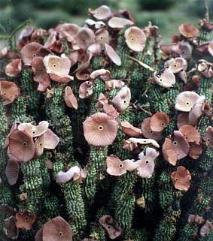Hoodia research
Hoodia gordonii, "Whoo De AH", is the botanical name for a leafless, spiky succulent plant that grows throughout the semi-arid areas of Southern Africa primarily the Kalahari desert. The San (local inhabitants) have rationally used Hoodia stems to stave off hunger and thirst when on long journeys, as it acts as an appetite suppressant. Eat this chemical, and your hypothalamus thinks you've just wolfed down three plates of food at the local buffet. Your hunger is abruptly cancelled. You just don't feel hungry anymore. Everything else is fine: there are no known side effects. But you simply don't feel like eating. At least that's what the hoodia companies explain you should experience. There are no known adverse side effects as a result of taking Hoodia in conjunction with prescription medications and other herbal supplements. However, if you are presently using any prescription medication and are under the care of a physician, you should always consult your physician before taking any supplement medication. Certainly any hoodia company out there that's selling an honest product is conducting a variety of testing, trying to find out who has counterfeit products and who has real products and trying to inform and educate their own customers about the fact that they have the real thing. But, as always, test results offered by companies who have financial interest in proving their product to be genuine simply don't carry the same weight as independent test results from an unbiased third company. Hoodia is also known by horticulture experts as being extremely difficult to cultivate in captivity. The plants rot easily, and they won't grow in regular soil -- they need sandy soil with excellent drainage. Also, to make things even more difficult, these plants aren't pollinated by bees, they're pollinated by flies. To attract the flies, their blooms emit a strong, repulsive odor that smells a lot like rotting flesh. Mass global interest has been shown for Hoodia since Pfizer, the international pharmaceutical giant, started to research Hoodia's potential to help people with obesity. Pfizer recently discovered Hoodia and decided to invest millions into researching the plants benefits as a new drug that would help with obesity. The research published by this company has catapulted Hoodia into the international spotlight. |
What is it impotence?
In order to increase the size of an erection, there must be an increase in blood flow and, at the same time, the blood has to be prevented from leaving the penis. A man with erectile dysfunction has either a problem getting an erection or difficulty maintaining one. This usually interferes with sexual activity by preventing penetration during intercourse. There are many effective treatments for erectile dysfunction. The most popular option is a class of drugs called phosphodiesterase type 5 (PDE5) inhibitors, which includes sildenafil (Viagra), vardenafil (Levitra) and tadalafil (Cialis). These drugs, taken in pill form from zero to 60 minutes before sexual activity, work in approximately 70 percent of men, though they are less effective in men with neurological causes of erectile dysfunction such as nerve damage from prostate surgery, diabetes or spinal cord injury. Men who do not benefit from medical or psychological treatment often have success with mechanical or prosthetic devices. External products, known as vacuum erection devices, are safe and highly effective, but many men and their partners find them unappealing. Another option is a surgically placed penile implant. However, because implants require surgery (with the risk of surgical complications), only 10 percent of men with erectile dysfunction choose this option. Vascular (blood vessel) surgery sometimes is recommended for young, healthy men who develop impotence after trauma to the groin. |
Skin care
The main cell types of skin are fibroblasts, adipocytes (fat storage) and macrophages. Sebaceous glands are exocrine glands which produce sebum, a mixture of lipids and waxy substances: lubrication, water-proofing, softening and antibactericidal actions are among the many functions of sebum. Sweat glands open up via a duct onto the skin by a pore. The hypodermis is not part of the skin, and lies below the dermis. Its purpose is to attach the skin to underlying bone and muscle as well as supplying it with blood vessels and nerves. It consists of loose connective tissue and elastin. The main cell types are fibroblasts, macrophages and adipocytes (the hypodermis contains 50% of body fat). Fat serves as padding and insulation for the body. Unless your skin is very oily, you will want to use a moisturizer everyday to keep your skin hydrated and healthy. Your skin needs moisturizer all year long as both the indoor winter heat, and summer sun can be equally damaging to your skin. As we age, our body undergoes various changes, and so does our skin. In our skin, we have tissues known as collagen and elastin. These tissues are mainly responsible for making our skin firm and stretchable. As we grow older, the amount of collagen and elastin in our skin naturally diminishes. As a result, our skin becomes less elastic and weaker, thus creating "wrinkles". |
|
|
Read our other articles:
No more worries
Overweight vs. overfat
Hair transplantation apply for women too!
Our healthy teeth
Advises for buying drug on internet
Medical conditions of menopause